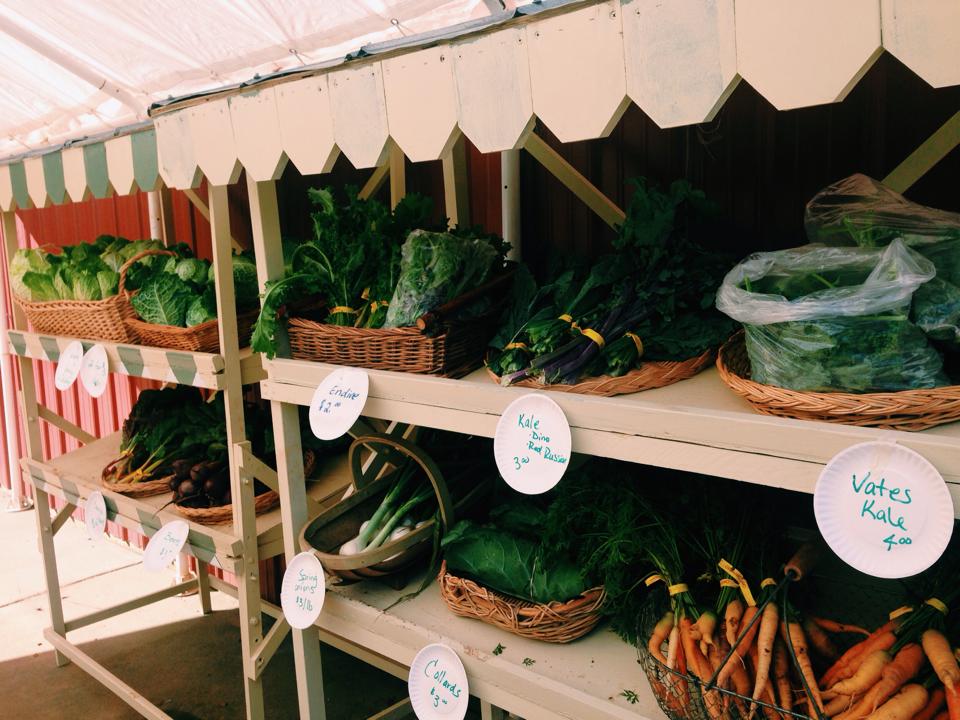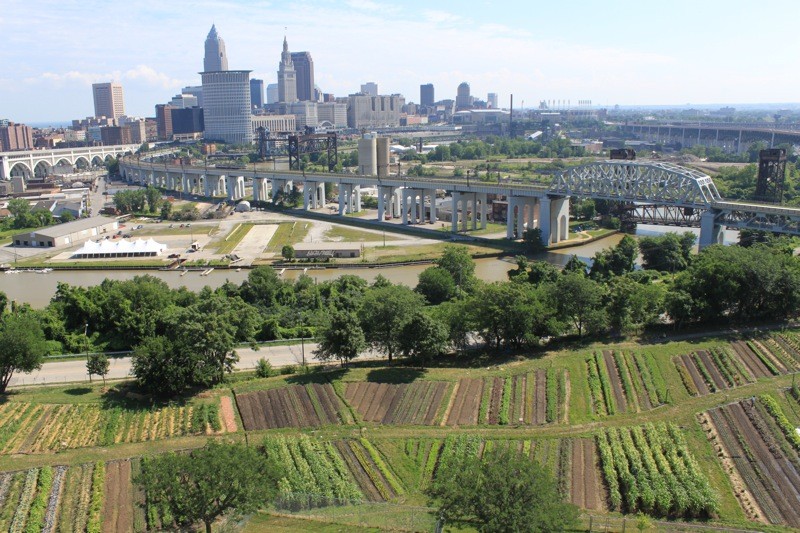Farm to Table refers to a method of harvesting and distribution that focuses on delivering fresh, seasonal, food to local businesses including restaurants and markets.
Why is this important to your community?
While the average metropolitan area in America only grows or raises less than 2% of the food it consumes, the demand for locally sourced produce in restaurants, at markets, and in households across the country has steadily increased in the last decade. A 2012 survey of South Carolina consumers conducted by researchers Willis, Carpio, and Young found that households are willing to pay almost 12% more for locally grown produce. Another survey, conducted with North Carolina food businesses, found that a majority of surveyed managers prefer to purchase locally-sourced, in-season food products. The Farm to Table movement seeks to create connections between local farms and food businesses (restaurants, markets, etc.). These connections provide an additional source of income for local farmers, provide businesses and consumers with fresh, locally sourced foods, and represent a potentially lucrative economic development strategy for the region. Supporting Farm to Table connections throughout the CONNECT region can ensure that local farms have a sustainable source of income and continue to contribute to the region.
Skip directly to
How Does It Work?
Resources
Using the Tool
Partners
Where Has It Worked?
Where is it appropriate to use?
What priorities does it address?
What other tools are related?
- Healthy Food Access Portal
- Community Gardens
How does it work?
There are several ways to employ Farm to Table methods at local and regional level. Farms can participate in organized farmer’s markets that attract buyers and chefs from local food establishments and restaurants. Many times, these markets provide an opportunity for local farmers to establish a steady, mutually-beneficial supply relationship with a business. Some restaurateurs even go so far as to establish their own farm off-site to exclusively supply their restaurant. Some companies and business agreements have emerged solely to fill in the gaps between farmers and consumers. Neighborhood Community Supported Agriculture (CSAs) organizations allow residents to purchase a ‘share’ of crops from a local farmer. The farmer then distributes produce from throughout the region to convenient drop-off locations to serve retail and business customers. Regardless of which Farm to Table method is utilized, this movement can have a significant impact on the economy throughout the CONNECT region, including the stabilization of local farms and an increase in tax revenue and jobs.
Resources
- CONNECT Our Future Food System Working Group Action Plan for Food Systems Improvement
- CONNECT Our Future Food System Working Group Food Systems Assessment Report
- “How the Farm-to-Table Movement Is Helping Grow the Economy”
- Community Supported Agriculture (CSA) Resource Guide for Farmers
- “Consumer Willingness to Pay for Locally Grown Produce Designed to Support Local Food Banks and Enhance Locally Grown Producer Markets”
Ready to get started?
Using the Tool
- Meet with representatives from local farms, food businesses, economic development agencies, and local food councils to discuss strategies to support the Farm to Table movement.
- Develop strategies that connect local producers to local consumers.
- In urban areas, consider establishing or working with an existing local food council to develop or expand a farmer’s market to serve businesses in the area as well as retail customers. The market could be open at specific times to meet the needs of restaurants and other food businesses or could facilitate special orders that are delivered direct to businesses.
- In rural areas, consider establishing or working with an existing local food council to develop a direct farm to business model that would include delivery or pick up of produce from small farms in the area. A small farmer’s market to provide residents with access to fresh food could be a component of this model.
- Consider hosting one or more “meet and greet” or “tasting” events where local businesses can discuss their needs with local farmers and local farmers can present their available crops in an effort to build direct business relationships.
- Help promote Farm to Table restaurants and businesses throughout the region. This could include promotional material showcasing local farmers and the restaurants and businesses utilizing local produce or a yearly celebration of local produce and cuisine.
- Support the expansion of CSAs and similar programs in your community, where residents can purchase a ‘share’ of produce from local farms, by working with local farmers and providing potential resources – e.g., space to pick up / drop of CSA shares, an online directory, or brochures.
- Support local public awareness and education about the economic and health impacts of the local farm economy in your community, to increase market awareness of and, potentially, demand for local foods.
- Support legislation and regulations that simplify the process of utilizing Farm to Table methods (permitting for farmer’s markets, approval processes for produce distribution).
Partners
- Advocacy Groups
- Businesses / Business Associations
- Colleges and Universities
- Community Development Organizations
- Departments of Education / School Districts
Where has it worked?
Poplar Ridge Farm CSA - Union County, serving Mecklenburg County, NC
About the Program
Poplar Ridge Farm is a family-owned, certified organic farm in Union County, North Carolina that has been serving the Charlotte metropolitan region since 1995. While the farm supports local farmers markets and direct sales to restaurants, a majority of business focuses on Community Supported Agriculture (CSA) and environmental and nutritional education. Since starting the CSA, the farm has continually expanded delivery service to now reach a large network of families and businesses throughout the Charlotte metropolitan region.
Why it works
The farm has a long history of serving families and businesses throughout the Charlotte metropolitan region with high-quality organic produce including arugula, beets, kale, okra, squash, green beans, peppers, and much more. Members have the option to take a full-share or half-share membership for the full growing season or during summer or fall growing seasons. The farm also has produce available for retail sale at a market stand throughout the growing season. In addition to providing fresh produce to residents, Poplar Ridge offers farm tours, cooking classes, Farm to Table chef events, and guest speaker events.
Ohio City Farm - Cleveland, OH
About the Program
The Ohio City Farm has attracted local and national attention for its unique approach. The project has transformed nearly six acres of unused city land for urban agriculture, community development, and job training a mile from downtown Cleveland. Formed by a consortium of partners, including the Refugee Response, Ohio City Near West Development Corporation, and the Cuyahoga Metropolitan Housing Authority, the farm is providing access to healthy foods in underserved areas. Through an agreement similar to a CSA, the farm directly supplies Great Lakes Brewing Company with produce throughout the season to use in its restaurant and brewery.
Why it works
The farm operates through a partnership with carefully thought out funding arrangements and provides a range of community benefits. In addition to the CSA which helps fund up front operations, the farm operates a weekly farm stand and kitchen incubator. The commercially licensed kitchen incubator provides affordable space to local food businesses and a testing ground for new restaurant and food business ideas. The incubator also provides assistance with feasibility studies and pre-development process for a kitchen assisted by outside funding. With a defined mission, the Ohio City Farm provides services well beyond the typical community farm and is able to provide direct benefits to the local economy, environment, and surrounding community.
- Businesses / Business Associations
- Community Gardens




